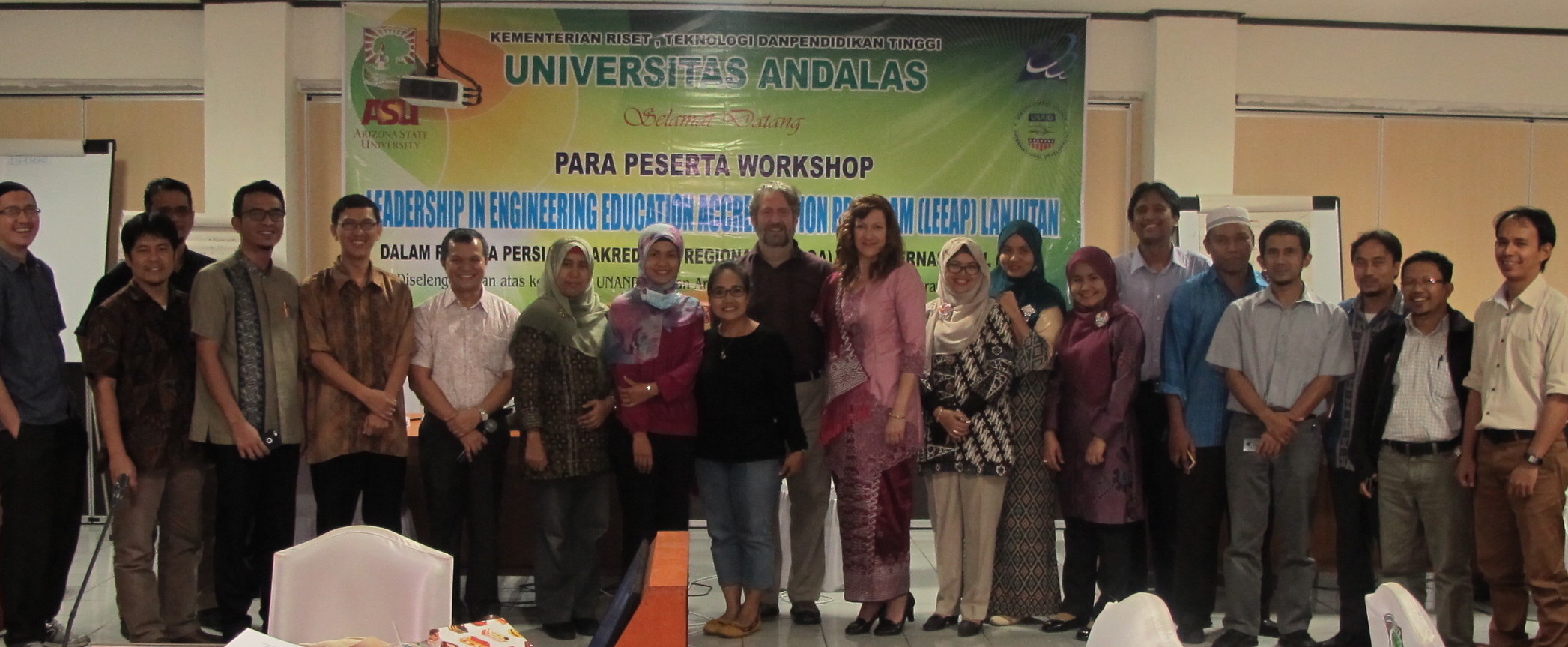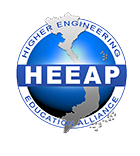Arizona State University, the U.S. Agency for International Development/Indonesia Higher Education Leadership and Management project (USAID-HELM) and Andalas University in Padang, Indonesia launched a collaborative effort in June 2015 under a special initiative called the Leadership Education for Engineering Accreditation Program (LEEAP).
The LEEAP initiative will serve as a catalyst to enhance the quality and competitiveness of science, technology, engineering and math (STEM) programs at higher education institutions in Indonesia that meet regional and international standards.
LEEAP leadership met to discuss how to develop impact projects that create solutions for Indonesia. Left to Right: Abdul Rahman (HELM QA Specialist), Hairul Abral (Dean, Andalas Univ.), John Rome (Deputy CIO, ASU), Jeff Goss (Assoc. Vice Provost, ASU), Scott Danielson (Faculty, ASU), Werry Darta Taifur (Rector, Andalas Univ.), Kathy Wigal (Assoc. Director, ASU), Tafdil Husni (New Rector inauguration on Nov 2015, Andalas Univ.) and Zainul Daulay (Dean, Andalas Univ.). Photo provided by HELM/USAID.
LEEAP is a result of the success of the Ira A. Fulton Schools of Engineering’s involvement in Vietnam with the Vocational and University Leadership and Innovation Institute (VULII) and the Higher Engineering Education Alliance Program (HEEAP).
VULII is designed to contribute directly to Vietnam’s national goal of increasing the quality of higher education while strengthening human and institutional capacity to contribute to Vietnam’s economic growth. HEEAP is designed to modernize traditional Vietnamese theory-based engineering programs by introducing applied and hands-on instructional approaches.
Jeff Goss, associate vice provost and the director of HEEAP, led the ASU delegation and emphasized LEEAP’s significance as an opportunity for industry and academic partners to develop impact projects with the U.S. government to solve some problems or create solutions.
“Accreditation will help to employ students in smart positions and retain the companies’ engineers and technicians to drive growth in the science and technology sector and increase opportunities for technology development and innovation,” Goss said.
The ASU team is assisting Andalas University in reaching global recognition and international accreditation. Andalas will then use it as the primary mechanism to attain international standing as a university.
Scott Danielson, director of the VULII and an associate professor in the Fulton Schools, explained that achieving international recognition requires understanding of what students know and working to improve what they know.
“Andalas University did very well in Indonesian accreditation and now we have to go beyond that,” he said. “Now the university must think beyond the borders of Indonesia and earn the school and its programs recognition in other countries.”
Danielson said there are two routes of international recognition, each with their own scope and uniqueness: Asian University Network-Quality Assurance (AUN-QA), and Accreditation Board for Engineering and Technology (ABET).

Kathy Wigal (Assoc. Director, ASU) and David Benson (Senior Lecturer, ASU) with the participating faculty members of Andalas University. Left to right: M. Ilhamdi Rusydi, Denny Helard, Ismet Hari Mulyadi, Dicky Fatrias, Jonrinaldi, Dedison Gasni, Ansiha Nur, M.T, Dewi Fitria, Menuk Primawati, David Benson, Kathy Wigal, Nilda Tri Putri, Shinta Indah, Elita Amrina, Rika Ampuh, Syafei, Sabril Haris, Junaidi, M. Imran Hamid and Primas Emeraldi. Photo provided by HELM/USAID.
“What we will teach the university’s leaders is what works to gain accreditation from both ABET and AUN-QA. There is more to do for either ABET or for AUN accreditation than what we will cover, because this is a large effort,” he said.
The most challenging part of the endeavor will be changing traditional attitudes and approaches to education, Danielson explained. It will take leadership by the dean and rector of Andalas University to drive that change.
The focus will be on improving the quality of academic study programs, which would be of primary importance in earning accreditation from AUN and ABET. The goal is to help the university understand what its students know and what they are capable of doing, and then taking steps to improve their knowledge and abilities.
“This is a special initiative of HELM so we have limited time,” Danielson said. “We are only working on a piece of this—the piece that is centered on continuous program improvement.”
The hope is that leaders and academic staff will be able to document in a data-driven way what students know and have learned and use that information to make good decisions about improving the program.
“That’s what we’re going to focus on. It is only a piece of achieving international accreditation, but I believe it is both the hardest part and also the most important part of the process,” Danielson said.
“The Andalas University LEEAP faculty are fortunate to have the active support of their rector and dean in their efforts,” said Kathy Wigal, associate director for curricular innovation in the Fulton Schools’ Office of Global Outreach and Extended Education.
She said workshops conducted in September, plus follow-up coaching and mentoring has sparked progress in several areas – including development of the academic program objectives and program outcomes, initial strategy and planning for assessment and evaluation necessary for continuous improvement, as well as the individual faculty course development efforts.
“We are continuing our coaching and training efforts by emphasizing innovative curriculum and teaching pedagogy including active learning techniques and problem-based and project-based methods,” Wigal said. “I am looking forward to seeing the next iteration of their efforts in January.”
The ASU LEEAP team acknowledges the complex nature of the international accreditation processes, and emphasizes the importance of collaborative work between all parties, including university leaders, program leaders, key faculty members and students.
Various workshops are planned for the coming year. In addition, results of work done under the initiative will be shared at a Partnership Network Seminar at the conclusion of the project.
Photo Captions
1. LEEAP leadership met to discuss how to develop impact projects that create solutions for Indonesia. Left to Right: Abdul Rahman (HELM QA Specialist), Hairul Abral (Dean, Andalas Univ.), John Rome (Deputy CIO, ASU), Jeff Goss (Assoc. Vice Provost, ASU), Scott Danielson (Faculty, ASU), Werry Darta Taifur (Rector, Andalas Univ.), Kathy Wigal (Assoc. Director, ASU), Tafdil Husni (New Rector inauguration on Nov 2015, Andalas Univ.) and Zainul Daulay (Dean, Andalas Univ.). Photo provided by HELM/USAID.
2. Kathy Wigal (Assoc. Director, ASU) and David Benson (Senior Lecturer, ASU) with the participating faculty members of Andalas University. Left to right: M. Ilhamdi Rusydi, Denny Helard, Ismet Hari Mulyadi, Dicky Fatrias, Jonrinaldi, Dedison Gasni, Ansiha Nur, M.T, Dewi Fitria, Menuk Primawati, David Benson, Kathy Wigal, Nilda Tri Putri, Shinta Indah, Elita Amrina, Rika Ampuh, Syafei, Sabril Haris, Junaidi, M. Imran Hamid and Primas Emeraldi. Photo provided by HELM/USAID.
Erik Wirtanen, erik.wirtanen@asu.edu
480-727-1957
Ira A. Fulton Schools of Engineering

